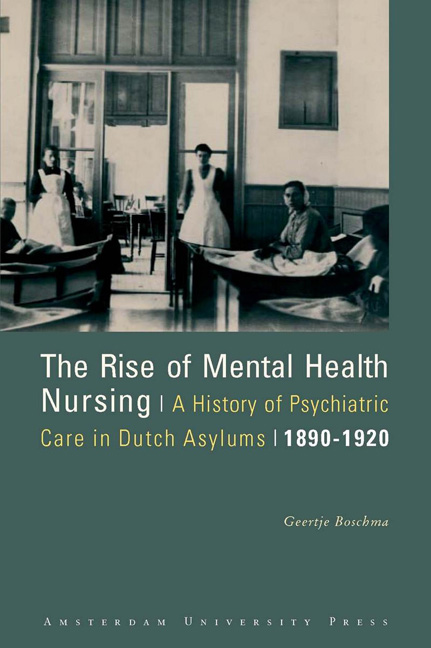Book contents
- Frontmatter
- Contents
- Acknowledgments
- Introduction
- Chapter I Asylum Reform Ideals: Personnel Matters
- Chapter II The Ideal of a Mental Hospital
- Chapter III Female Compassion: Mental Nurse Training Gendered Female
- Chapter IV The Burdensome Task of Nurses
- Chapter V Negotiating Class and Culture
- Chapter VI The Marginalization of Male Nurses
- Chapter VII Controversy and Conflict over the Social Position of Nurses
- Conclusion: The Politics of Mental Health Nursing
- Appendix
- Notes
- List of Illustrations
- List of Abbreviations
- List of Archives
- Bibliography
- Index
Chapter I - Asylum Reform Ideals: Personnel Matters
Published online by Cambridge University Press: 28 January 2021
- Frontmatter
- Contents
- Acknowledgments
- Introduction
- Chapter I Asylum Reform Ideals: Personnel Matters
- Chapter II The Ideal of a Mental Hospital
- Chapter III Female Compassion: Mental Nurse Training Gendered Female
- Chapter IV The Burdensome Task of Nurses
- Chapter V Negotiating Class and Culture
- Chapter VI The Marginalization of Male Nurses
- Chapter VII Controversy and Conflict over the Social Position of Nurses
- Conclusion: The Politics of Mental Health Nursing
- Appendix
- Notes
- List of Illustrations
- List of Abbreviations
- List of Archives
- Bibliography
- Index
Summary
The Appeal of Institutional Care and Moral Treatment
Until the nineteenth century, institutional care for the mentally ill had only existed on a small scale in the Netherlands. Most of the mentally afflicted either remained with their families or were boarded out by their legal guardians with relatives or other families for a fee. For profoundly disturbed lunatics who threatened themselves, their relatives, or their fellow citizens, most towns maintained a facility in which to lock them. Usually this was a prison or a separate wing of the local charitable guest- or poor-house. Only a few towns had an asylum or madhouse for this purpose, and these often inadequate facilities were part of the extensive network of poor relief services in existence since the Reformation.
The organizational management of insane asylums was similar to that of other guest- or poor-houses. Boards of regents administered the asylums, which were financed by owned stock or property such as land or farms, or through the support of the local government. Usually a married couple served as the steward and matron, assisted by a few servants. They managed the asylum as they would any large household. Medical care was rarely available, and if so only for physical pain and sickness. The mentally ill shared their residence with the old, sick, and orphaned, or with convicts or other socially marginalized indigent people. Poor relief was both a charitable service and a measure to protect the municipal community against social upheaval.
However, under the influence of the Enlightenment, medical and social opinions on insanity changed during the late eighteenth and early nineteenth centuries, both in Europe and North America. Enlightened reformers rejected the notion of insanity as a spiritual malady beyond human control. Despite their afflictions, reformers argued, the insane were rational beings with a human nature and should be treated as such. This view replaced previous notions of insanity as a loss of reason that supposedly kept the afflicted in a bestial stage and legitimized their enchainment. Reformers believed that a pedagogical moral – that is social-psychological – approach and kind supervision combined with proper medical treatment within the confines of a carefully designed asylum could indeed cure the insane.
- Type
- Chapter
- Information
- The Rise of Mental Health NursingA History of Psychiatric Care in Dutch Asylums, 1890–1920, pp. 31 - 58Publisher: Amsterdam University PressPrint publication year: 2003



